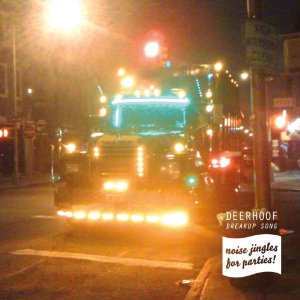“We’ve been called a lot of things, as you know. But pop has always marked the spot on the Deerhoof treasure map … We’ve just finished a sensational record of Cuban-flavored party-noise-energy music.” So goes drummer Greg Saunier’s prologue to Deerhoof’s 11th album, Breakup Song. However, while governed by a pop sensibility that’s underpinned by John Dieterich and Ed Rodriguez’s sugar-coated guitar hooks and Satomi Matsuzaki’s fragile, child-like vocals, the San Francisco quartet remain one of indie rock’s most willing outliers. Since they began life in 1994, Deerhoof have always seemed to take pleasure in remaining outside the mainstream, refusing to budge on a heady, idiosyncratic concoction that places pop at its centre but draws from a wider palette of jazz, art rock and noise. Pairing the whimsical with the ferocious, Deerhoof build pop to knock it down.
And so we have Breakup Song. Arriving just 18 months after Deerhoof vs Evil – the group’s most restrained album – it finds the band in familiar territory, packing a punch in the vein of their earlier work, pairing jangle-pop choruses to warped synths and distorted guitar lines. The title track, for example, is a characteristically abrasive affair, Matsuzaki battling to be heard beneath syncopated snares and screaming guitar stabs. The relentless, bass-driven ‘We Do Parties’ is a dazzling highlight that’s born of the same garage rock template that was laid down on Reveille, while ‘Zero Seconds Please’ takes the post-punk of ‘Wrong Time Capsule’ or ‘L’Amour Stories’ and adds a James Murphy synth bounce to produce an intelligent slice of dance punk.
All well and good, but nothing out of the ordinary. Saunier once said of Deerhoof’s creative blueprint, or the lack thereof, “We really don’t know what we’re doing. We make our music and write our lyrics, but there’s no real plan. It comes out the way it comes out.” But as much as Deerhoof’s music rejects familiar structures and defies easy genre classification, it has lost its element of surprise. Indeed, on first listen you might not know when Matsuzaki’s vocal hooks will be overcome by a percussive catharsis, but you can rest assured that they will. Her nonsense, Dadaist lyrical refrains have also become hackneyed, with ‘Mario’s Flaming Whiskers III’s chorus ensuring that Breakup Song is in keeping with the rest of the Deerhoof oeuvre, while the album’s unimaginative vocal melodies (see ‘The Trouble With Candyhands’’ high-low-high-low chorus) are repeated ad infinitum until their saccharine lines begin to grate.
Deerhoof, therefore, feel like they exist purely to be admired. Like a remarkable piece of architecture or a well-designed car, they can be appreciated for their aestheticism without ever really drawing you in on any emotional level. And while they have always possessed an arcane charm, it is surely no longer adequate to label a band whose style has barely evolved in almost two decades as ‘experimental’. Listen to 1997’s The Man, The King, The Girl and you’ll be faced with the same tropes that prevail on Breakup Song. Indeed, many critics are in thrall to Deerhoof’s eccentricities but though their sound is undoubtedly unique, their music has become formulaic by their refusal to grow and it’s hard to see them squeezing much more out of their brand of aural maximalism. So while Deerhoof remain part of a genre of one, don’t confuse their singularity with greatness.


